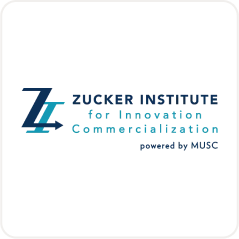The Zucker Institute for Innovation Commercialization was formed in 2022 to be a best in class tech transfer office on the cutting edge of what the industry means today. The result of the reorganization of Medical University of South Carolina (MUSC)’s two previous commercialization institutions, Zucker has the mandate to do things differently to bridge the gap between business and science.
Joe Fiore, former entrepreneur and Zucker’s current Vice President, Operations & Business Development, was brought in to help Zucker achieve its ambitious goal. Says Joe about coming to MUSC with fresh eyes, “I knew immediately we needed tools to do what right-brained commercialization people do: talk to researchers abstractly and understand whether the problem has a large demographic.” Joe may have known he needed to find ways for MUSC to be more business-minded, but he didn’t expect to find a solution in Tradespace, which he initially evaluated as a CRM.
“Instead of starting from a blank piece of paper, Tradespace’s technology rating tells us if something has legs in a matter of less than 12 hours, giving our licensing managers an incredible head start.”
Discovering how Tradespace cut down Zucker Institute’s initial weekslong tech evaluation process
Prior to Tradespace, the Zucker team had been “forcing” its existing docketing system to be a CRM, something it wasn’t designed to do. Charged with finding a true CRM, Joe discovered Tradespace and reviewed it along with the “usual suspects.” But then, “It became clearer and clearer that Tradespace was potentially going to be the end all be all for us,” as Joe put it.
“The first step we needed to get under control was how we triage technologies when they come in the door, and Tradespace let us very quickly begin not only the triage process but marketing too,” Joe explains. What used to take licensing managers weeks in a spreadsheet — or turning to outside counsel — now takes them only a day with Tradespace: “Instead of starting from a blank piece of paper, Tradespace’s technology rating tells us if something has legs in a matter of less than 12 hours, giving our licensing managers an incredible head start. Its score generator has heavily influenced our entire evaluation process.”
On top of Tradespace’s ability to help his team promptly make sense of new technologies on their own, several other factors made Joe know he had found his commercialization CRM. Joe appreciated the direct line of communication he had into a dedicated member of the team, the speed of Tradespace’s implementation (which doesn’t require an implementation manager), the fact that Tradespace could be customized for his unique organization, and its use of APIs to integrate with his other systems. As a result, Joe felt fully comfortable presenting Tradespace as the best option for the Zucker Institute based on his findings and input from the team.
“Tradespace allows you to focus on the things that really matter, not just the busy work of filing patents, something a lot of IP teams are bogged down with.”
Streamlining Zucker Institute’s IP process and unlocking portfolio insights
Now, Zucker Institute uses Tradespace’s full suite of products, which lets the organization track a technology “from intake all the way through licensing or startup.” After evaluating a technology, the team either marks it as an active opportunity, a passive one, or a “no” on the platform. From there, the team uses Tradespace to track each opportunity’s IP and marketing activities. All throughout, the team is able to assign each other tasks and emails and see what actions need to be taken care of. Then, they record the final outcome in Tradespace as well. Joe calls bringing the IP process “under one roof” a “jump into the future.” Tradespace lets his team “go back quickly and easily to see what’s been done rather than clicking 15 different places and not being able to find anything.”
This efficiency has had higher-order effects, as Joe notes. “Tradespace allows you to focus on the things that really matter, not just the busy work of filing patents, something a lot of IP teams are bogged down with.” As the Zucker team has gotten the chance to use Tradespace to evaluate its existing IP portfolio, Joe reports that it’s unlocked strategic insights they didn’t have before — information like where the portfolio’s strengths lie and which departments its technologies come from.
Better explaining IP to potential partners and patent decisions to inventors
Tradespace’s marketing capabilities have been especially useful to Zucker as it establishes its business development function, something MUSC didn’t have before. In addition to using Tradespace Commercialize’s CRM function to record who they talk to, when, and how those conversations are going, the Zucker Institute’s portfolio managers use its marketplace, in conjunction with similar systems, to quickly generate visually appealing nonconfidential summaries — something else Joe says MUSC, and the entire industry for that matter, hadn’t figured out how to do well either.
“A hard conversation every tech transfer office has to have is telling a researcher they aren’t going to move forward. Tradespace changes the conversation by giving us the ‘why.’”
If there’s one thing that Joe appreciates the most about Tradespace, it might be how it helps him better communicate with scientists: “Instead of it feeling like a subjective decision, we can now give them access to Tradespace and show them the reports,” Joe shares. “You can send a researcher to the Inventor Portal and say, ‘Here’s real data on the technology you presented. You can see there’s not really a market there, there’s barriers to entry, and that there are already five other closely-related patents.’ A hard conversation every tech transfer office has to have is telling a researcher they aren’t going to move forward. Tradespace changes the conversation by giving us the ‘why.’”
Going from cost center to an invaluable part of any research institution
As Zucker Institute’s operations leader, Joe has an astute view of his role: “Our institution supports us because it views the Zucker Institute as a valuable piece to their innovation puzzle. For us, streamlining operations by improving time and output is money, so Tradespace is invaluable.”
When it comes to showing the value of tech transfer offices, Zucker Institute has been successful in its two years of existence. Already held in high regard, its future holds more funding, expansion, and a surrounding innovation district. “We’ve flipped the script so we’re no longer looked at as an expense.”


